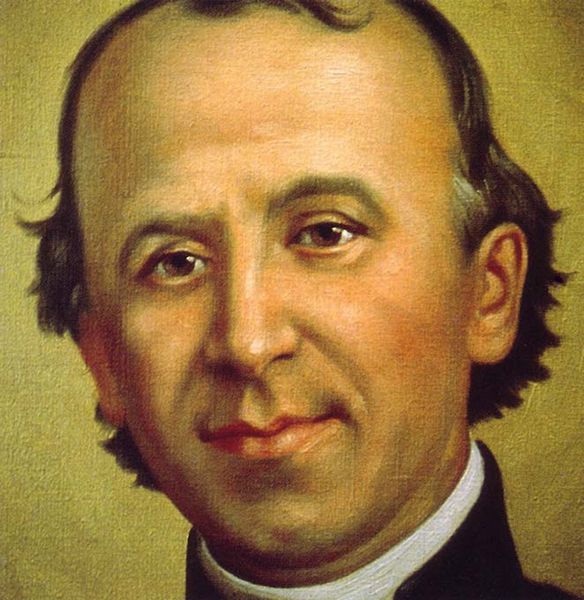- Paul Joseph Nardini
Infobox Saint
name=Paul Joseph Nardini
birth_date=July 25, 1821
death_date=January 27, 1862
feast_day=January 27
venerated_in=Roman Catholic Church 
imagesize=205px
caption=Paul Joseph Nardini
birth_place=Germersheim ,Germany
death_place=Pirmasens ,Germany
titles=Father of the Poor
beatified_date=26 June 2006
beatified_place=Speyer ,Germany
beatified_by=Pope Benedict XVI
canonized_date=
canonized_place=
canonized_by=
attributes=
suppressed_date=
issues=Paul Joseph Nardini (
July 25 ,1821 -January 27 ,1862 ) was a diocesean priest and the founder of the religious order theFranciscan Sisters of the Holy Family .Biography
He was born at
Germersheim , inGermany , to Margaret Lichtenberger, a single mother. She gave him the name Paul Joseph Lichtenberger at birth. Margaret was unemployed and thus not able to personally provide for herself and her son. She turned her son over to her paternal aunt, Maria Barbara, and her husband Anton Nardini. This couple adopted him, gave him their own surname, and raised him as they would their own son. [http://www.vatican.va/news_services/liturgy/saints/ns_lit_doc_20061022_nardini_en.html Vatican News story on the beatification of Father Nardini] ]Nardini displayed extraordinary diligence in his studies, and made excellent grades. In so doing, he drew the attention of several adults. After he completed grammar school, it became clear that Paul was interested in the priesthood, and the local bishop
Johannes von Geissel , had him admitted to the seminary atSpeyer . There, Nardini studiedphilosophy from 1841 through 1843. Upon completing his philosophy studies, he was sent to theLudwig Maximilians University of Munich by bishopNikolaus von Weis . There, Nardini obtained a degree intheology , and graduated summa cum laude.On
June 5 ,1846 , he receivedminor orders . The next day, he was ordained asubdeacon . He was sent back to Speyer on the completion of his studies, and was ordained adeacon on August 11. The following August, he was ordained to be a priest in the cathedral.In his first years in the priesthood, Nardini served as the vicar of a parish in
Frankenthal , regent of another parish in Geinsheim, and prefect of the diocesan boarding school of Speyer. In February 1851, Nardini was made the parish priest of the diffuclt and financially poorPirmasens parish. Nardini requested that his mother relocate to his new assignment with him, and she accepted. Nardini was noted for his remarkable character during this period. His example of sacrifice, determination, self-abnegation, and apostolic zeal was very important in evangelizing and drawing people to the church in the largely Protestant area. His effectiveness as a priest, combined with his preaching and cathecizing skills and his love of the Eucharist, earned him a reputation for sanctity and led to his being called the "Father of the Poor" in the community.Nardini became very concerned about the conditions in which the poor children and older adults in the Pirmasens area were forced to live. In 1853, he requested that the Sisters of the Most Holy Redeemer of Niederborn come into Pirmasens to help in the education of the poor children of the area. He also asked them to help in the care of the sick and those who suffered from material or spiritual misery, regardless of their race or religion. After two years, it became clear that the amount of work to be done was more than the nuns could handle, and they were recalled.
Nardini then brought in four young women from the Franciscan third order. On
March 2 ,1855 , these sisters founded with Nardini the Congregation ofPoor Franciscans of Pirmasens . They would eventually change their name to theFranciscan Sisters of the Holy Family , and still later to the Sisters of Mallersdorf. Nardini personally took on the work of the care and formation of the sisters of the new order. He also ensured that their food and lodging in the economically challenged area was regularly secured, often at the cost of depriving him of his own meals. While performing a work of mercy, delivering theViaticum to a dying parishioner on a cold night in the winter of 1861-1862, Nardini contracted pulmonarytyphus . He died as a result of the disease onJanuary 27 ,1862 .Veneration
Nardini was considered a
saint by the members of his community, and by all the sisters of the order which he had founded, who at the time of his death numbered 220 in 35 locations. His mortal remains were entombed in the Chapel of the Congregation of the order he founded in Pirmasens. The cause for hisbeatification was begun in June, 1997, in theDiocese of Speyer . OnDecember 19 ,2005 ,Pope Benedict XVI officially recognized theheroic virtue s of Nardini, thus formally making him eligible for beatification. Six months later, onJune 26 ,2006 , the Pope officially recognized the miracle required for Nardini's beatification, the miraculous healing of one of the nuns of the order he founded, Stephana Beyer, from late-stage cancer, which happened after the sisters of her order prayed at Nardini's tomb for her. [http://www.dw-world.de/popups/popup_printcontent/0,,2212744,00.html Priest Nardini Beatified in Speyer, First in Germany in 10 Years from Deutsche Welle] ] Pope Benedict XVI authorized theCongregation for the Causes of Saints to promulgate his cause. He was formally beatified in theSpeyer Cathedral byFriedrich Cardinal Wetter , who read an Apostolic Letter from the pope officially recognizing Nardini as beatified. There were some 2,000 people present for the ceremony, including some 600 nuns of the order he founded, with thousands of others watching the ceremony on closed circuit television in the square of the cathedral. It was the first beatification in Germany in 10 years, and the first one in which the pope himself was not present. The currentbishop of Speyer ,Anton Schlembach , called Nardini a "highly gifted minister" who "opened people's eyes to the necessity and beauty of the priesthood".See also
*
Mallersdorf Abbey
* The town Mallersdorf-PfaffenbergReferences
Wikimedia Foundation. 2010.
